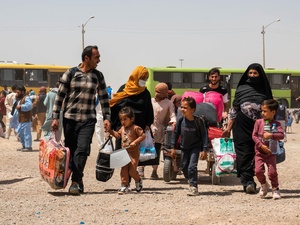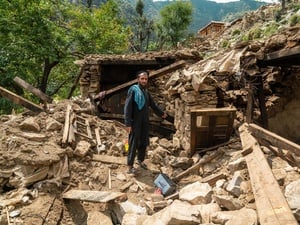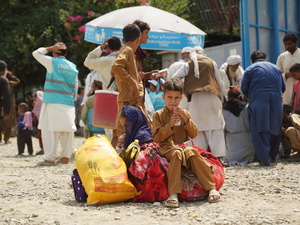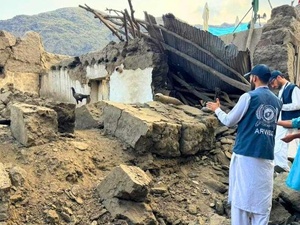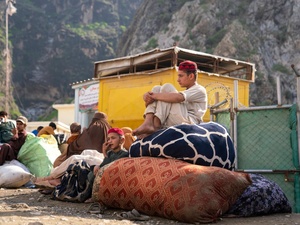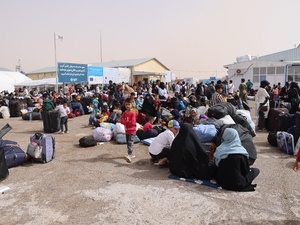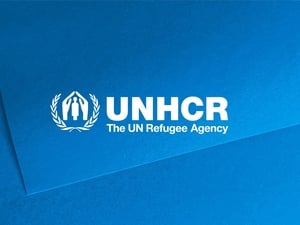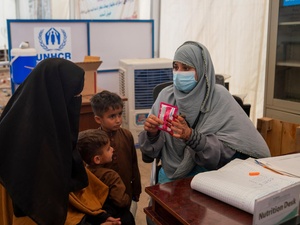Afghans surge homewards under UN refugee agency return programme
Afghans surge homewards under UN refugee agency return programme

Afghan refugees returning home last year.
JALALABAD, Afghanistan, March 4 (UNHCR) - Returns to Afghanistan surged on Monday with the repatriation of 3,009 Afghans on the second day of a new UNHCR programme.
Afghans anxious to return home with the new aid package arrived at the agency's registration centre at Takhta Baig, near Peshawar, Pakistan throughout Monday morning, UNHCR reported. By the time the centre closed Monday, more than 560 families had been registered. Aid workers said that hundreds of Afghan refugees coming from as far away Karachi and Lahore had camped outside Takhta Baig over the weekend.
Monday's returnees arrived in some 200 vehicles. Aid workers reported that groups of families joined together and hired trucks, but others returned in their own vehicles.
At the kick-off of the UN's assisted repatriation programme on Friday, only 196 Afghans returned, but the number dramatically increased today following wide publicity about the opening of the Takhta Baig centre.
Each of the Afghans repatriating under the new UNHCR initiative receives $20 to finance their transport homewards. The funds are distributed at the Afghan border town of Mohmandar, where UNHCR has set up a cash distribution point.
Families participating in the UNHCR-assisted operation will receive a returnee kit containing blankets, a plastic tarpaulin, a hygiene kit, tools and other items that are being distributed by the German relief agency GTZ at centres in each of Afghanistan's 32 provinces. The UN's World Food Programme also provides participating families with 150 kilogrammes of wheat.
The registration centre at Takhta Baig is the first of seven that UNHCR plans to establish in Pakistan to register returnees four days a week, from Monday through Thursday. Each of the seven centres will be able to process up to 5,000 persons a day once they are fully operational, for a total of more than 35,000 UN-assisted returns daily from Pakistan alone.
UNHCR expects to open its second registration centre in Pakistan at Hub Chowki, near Karachi by mid-March, and a centre will open at Baleli Village near Quetta shortly afterwards. Another centre will open in early April at Alizai in North-West Frontier Province. Two mobile registration centres will open by mid-April in the mountainous Nawa Pass, bordering on Afghanistan.
Aid workers in Jalalabad report that the situation continues to improve in parts of eastern Afghanistan. UNHCR and its partner agencies have begun implementing various quick-impact projects throughout Afghanistan that were disrupted in the aftermath of the U.S.-led war on terrorism in the country.
A concrete beam plant to support UNHCR's shelter programme for the poorest of the poor among returnees to Jalalabad began operating in February. Outside Jalalabad, villagers two weeks ago resumed the construction of a UNHCR-funded mini-hydroelectric facility in a village of 200 people. On Monday, teams working under the auspices of the UN's mine clearing agency were seen along the Torkham-Jalalabad road clearing a field of mines.
Despite the many positive signs, the agency still cautions Afghans about returns to some regions.
"Because of the still precarious security situation in some parts of Afghanistan, people participating in the UNHCR-facilitated repatriation initiative are cautioned to avoid certain areas, including Paktia, Khost, Paktika, Zabul, Uruzgan (south), Nimroz, Helmand, Farah, Tora Bora and Sholgara," the agency reported.
Most of the Afghans heading home on Monday were bound for Kabul, UNHCR reported, though many also planned to stay in Jalalabad, in eastern Afghanistan.
UNHCR has requested $271 million to fund the repatriation and rehabilitation effort over the period between October 2001 and December of this year, as well as to care for the more than 3.5 million Afghan refugees currently in Iran and Pakistan and the various Central Asian states.


